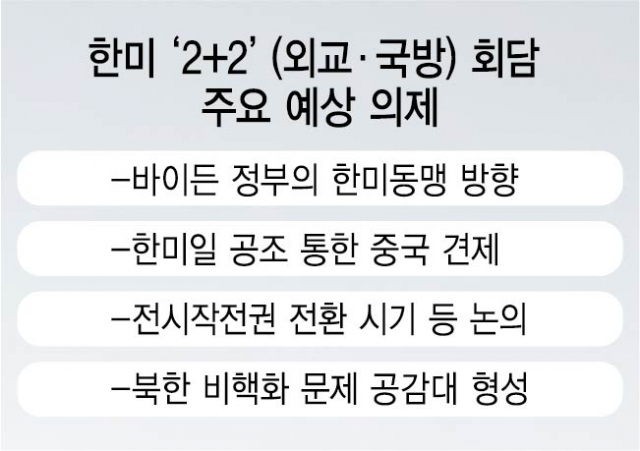Diagnosis of domestic diplomatic and security experts
2+2 Meeting with the Ministers of Foreign Affairs and Defense
U.S. Proposals to Join Anti-China Front
Even if I notice in China, it’s hard to expect real profits
‘Diplomatic roots = ROK-US alliance’ clarify
 viewer
viewer
The moment of choice is approaching in Korea as China and the United States enter into full-scale conflict and competition with the bilateral meetings (National People’s Congress and National People’s Political Negotiation Meeting) and Quad Summit, respectively. At the ‘2+2’ (Korea-US Foreign Affairs and Defense Ministers) meeting with US Secretary of State Tony Blincoln and Defense Minister Lloyd Austin’s visit to Korea starting on the 17th, the US side will present the role of South Korea’s alliance corresponding to the conclusion of the defense cost negotiations. It is an observation that the possibility is high.
Experts agreed that in this process, unless it is a sharp military issue that could threaten our security, we should no longer hesitate to participate actively in various democratic multilateral councils led by the US. It was pointed out that the’strategic ambiguity’ diplomacy through the days of President Donald Trump, who neglected the alliance, has now lost its effectiveness. In particular, there were considerable opinions that Korea had no value to share with China in that the order pursued by China is hegemonicism that reproduces the old Chinese order.
On the 14th, diplomatic and security experts said that the results of the two meetings in China ended on the 11th and the Quad Summit ended on the 13th (local time), the United States expressed the will to press against China, and China was fighting a resolution against the United States. They analyzed that each will explicitly surfaced. In addition, from the perspective of South Korea, it was pointed out that the conclusion of the defense cost negotiations and the visit of Ministers Blincoln and Austin, followed immediately after their visit to Japan, will be a critical turning point in which a clear choice must be made amid the conflict between the United States and China.
Experts stressed that it is time for Korea to make a voice with the United States and Japan in line with the values of democracy, freedom, and human rights amid the reorganization of the Northeast Asian order. There were also voices saying that we should rather lead various multilateral councils such as Quad Plus (a plan to add Korea, New Zealand, and Vietnam to the quad).
Deok-min Yoon, former head of the National Foreign Affairs Office, said, “We are right at any level to participate in the multi-layered democracy and human rights alliance that the United States creates, such as the 7 major countries (G7) expansion conference, the 10 democracy conferences (D10), and the Quad Plus.” He pointed out that it is not right to say that China’s arguments, such as the Regional Comprehensive Economic Partnership Agreement (RCEP), run out with tabs and greet them, and refrain from the US’s assertion.” Professor Nam Nam-wook of Korea University’s Faculty of Unification and Diplomacy also said, “You can participate in the solidarity of the democratic values alliance but only observe military training. It is a ceremony that shows solid restoration, so there will be a comprehensive discussion on the overall direction of the alliance.”
 viewer
viewer
Some advice came out that it is necessary to put down concerns about the breakdown of relations with China due to participation in the anti-China front. As the retaliation for the deployment of the’high-altitude missile defense system (THAAD)’ has not been resolved at all in the current regime, it is not clear the benefits we will get from seeing China. On the 11th, the Chinese state media Global Times wrote in an article by Qing Xiaohe, a professor at the Institute of International Relations at Renmin University of China, saying, “If Korea joins the Quad, it will destroy mutual trust.” The Korean government should maintain strategic ambiguity and be cautious about joining the Quad. I have warned.
Shin Beom-cheol, director of the Center for Foreign Affairs and Security at the Economic and Social Research Institute, said, “The Korean government is negative about the participation in the quad, but China does not do it well just because the distance is distanced. It is better to keep the profits while being involved in the quad.” Kang Joon-young, head of the Center for International Area Studies at Hankuk University of Foreign Studies, emphasized, “We must inform China of the ROK-US alliance and the inevitable position as a democratic state,” and emphasized that “the roots of diplomacy should be the ROK-US alliance.”
Experts feared that China’s expansion of hegemony resembled the past Chinese order based on master-slave relations, such as a tribute system, and should be wary of this. It was predicted that the possibility that China would treat neighboring countries, such as Korea, as equal partners, just because we do tightrope diplomacy between the US and China.
/ Reporter Yoon Kyung-hwan [email protected], reporter Joo Jae-hyun [email protected], reporter Kim Nam-gyun [email protected]
< 저작권자 ⓒ 서울경제, 무단 전재 및 재배포 금지 >
